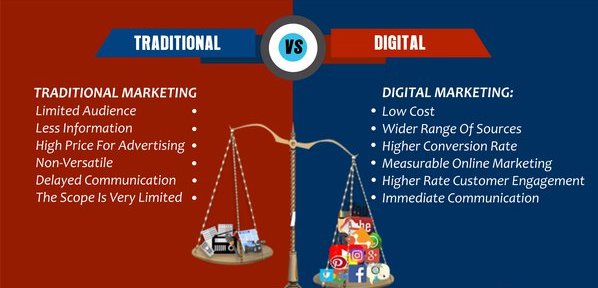Digital marketing can be tweaked, adjusted and micro-targeted on a dime. This is in stark contrast to traditional marketing campaigns that often require weeks and even months to get off the ground.
Digital marketing is also highly trackable, which gives marketers a holistic view of their results. This allows them to quickly see if an ad campaign is working or not.
1. Reaching a Global Audience
Digital marketing is the process of promoting a business via online platforms and channels. It is used by businesses of all sizes to connect with their target audience and convert them into customers/clients. It includes various activities such as social media marketing, search engine optimization (SEO), pay-per-click advertising, content marketing, email marketing campaigns, and website/blogs.
Using a combination of paid and organic methods, digital marketing can reach a global audience at a much lower cost than traditional marketing. Furthermore, it allows for a more targeted approach, which can lead to better results for businesses.
It also provides the opportunity to create personalized marketing, which can help to increase engagement and conversion rates. This is particularly important given the amount of time that consumers spend online. While some consumers may be cynical of digital marketing due to their own disgruntled experiences with pop-ups, coupon emails, or social media ads, there is no doubt that it can provide a significant return on investment. With the right team and strategy, digital marketing can drive measurable and tangible results for businesses of all types.
2. Personalized Marketing
Digital marketing allows you to target your ideal customer based on a variety of factors, such as demographics, networks, and interests. This is very useful for businesses looking to increase conversions, as you can deliver your message directly to the people who are most likely to buy from you.
It also helps you build relationships with your audience through social media, blogs, and email. This enables you to respond to questions or concerns instantly, and this builds brand trust and loyalty.
Additionally, digital marketing allows you to track nearly every aspect of your campaign. This includes ad clicks, social media page views, website traffic, and more. This makes it much easier to prove your ROI and understand what tactics are working best for your business. This is in stark contrast to traditional marketing, where you might not be able to see the results of your efforts until well after they’ve been implemented. This can lead to misallocation of resources and unnecessary spend. Digital marketing avoids this problem by providing clear and concise data that can be analyzed to make the right decisions for your budget.
3. Tracking
Digital marketing is highly trackable compared to traditional methods. Businesses can monitor things like ad engagement, social media shares, website traffic, keyword rankings, and return on ad spend. This gives them a start-to-finish view of their campaigns’ performance. This data is crucial for making informed decisions and optimizing campaigns.
Digital marketers are able to see how well their campaigns are performing in real-time. They can stop them if they aren’t working and make changes to improve them. This is something that can’t be done with billboards or printed ads.
Digital marketing is also more effective at reaching a global audience. Using SEO, PPC, or other digital marketing techniques, moving companies can target specific audiences by their location, age, interests, networks, and more. This makes it easier to connect with customers and build brand loyalty. It also creates an advantage over local competitors who can’t match a business’ reach.
4. Flexibility
During the recent global pandemic, businesses of all sizes found themselves facing uncertainty and economic stress. With reduced consumer spending, restrictions and fears, many small business owners were forced to cut back on marketing and sales.
Digital marketing provides the flexibility that these companies need to reach and connect with consumers. While some marketing strategies like PPC and SEO can take time to produce results, the vast majority of digital campaigns can be launched and begin driving traffic and conversions practically overnight.
Additionally, when a campaign is not producing the expected results, changes can be made almost immediately. This is not the case with traditional marketing methods, which often require weeks or months of planning and execution before any results can be seen. As a result, digital marketing is able to adjust quickly and effectively – giving it an advantage over traditional marketing.
5. Cost-Effectiveness
Digital marketing helps your business reach out to a global audience as compared to traditional methods that are restricted by geography. This gives small businesses a rare opportunity to fetch international clients, and witness a boom in their sales.
Unlike traditional marketing, which can cost you a fortune, digital marketing is highly affordable and effective. It allows you to create campaigns that are highly personalized, thereby increasing the likelihood of a conversion. In addition, it helps your brand stay on top of customers’ minds with frequent updates.
Digital marketing also gives you a clear-sighted view of results, which is not always the case with traditional marketing. For instance, it is difficult to determine how many people flipped to a certain page in a magazine or whether they read the advertisement at all. But with digital marketing, you can track every aspect of a campaign – from social media views to ad clicks and website visits. This helps you measure your success and make changes accordingly. This also enables your business to build a solid customer base and enhance their loyalty for your product/service.



